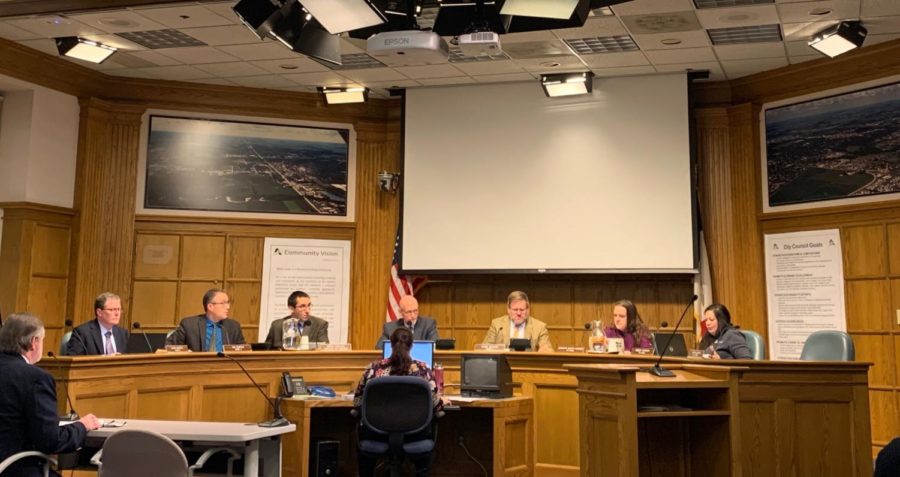Vacation lodging ordinance goes into effect
November 30, 2019
A new city law took effect Sunday regulating guest lodging, such as Airbnbs, in Ames.
Short-term rental policies have been an ongoing conversation within the Ames City Council, with one of the goals to convert rental housing into home-ownership.
Ames City Council Ex-Officio Devyn Leeson said the person who currently lives at the home would be considered the owner.
“This goal is based on the general idea that a high density of rental units provides instability in a neighborhood, as the people living in these units change from year to year,” Leeson said.
“The rental ordinance that was repealed by the state would have made it so a maximum of 25 percent of houses in near-campus neighborhoods could be rental units,” Leeson said. “Some neighborhoods had more than 60 percent of the units as rentals, so I thought this ordinance would have been bad for students. Over many years, it would have drastically reduced the number of rental housing near campus and forced poor students farther away.”
After 18 months of discussing, reviewing and analyzing the ordinance, the Council unanimously voted to enact the legislation.
“Many students would have had to live in the expensive high rise apartment complexes that make a lot of money for big businesses and not a lot for Ames residents,” Leeson said. “After the ordinance was made illegal by state law changes, the Council has continued to look for ways to achieve the goal of rental conversions, and that is partially why the vacation lodging discussion started.”
The ordinance is known as the “Guest Lodging Code of the City of Ames,” and is in a new chapter of the Ames Municipal Code.
Vacation lodging is now defined as guests staying in an entire home that is not the owner’s primary residence and could be found commonly through an online market or website, according to the Ames Municipal Code. The vacation lodging can be offered as an ongoing basis throughout the year, but the contract for each guest will have a limit of 30 days or less.
“The goal of the vacation lodging ordinance is then to limit the number of vacation rentals there can be in a neighborhood,” Leeson said. “Vacation rentals take the idea of neighborhood instability and amplify it as the people living in a unit change from month to month. Someone [on the] Council mentioned this issue, saying it leads to people never knowing their neighbors and not feeling tied to the community.”
Along with limiting the number of vacation rentals, the goal of the ordinance was to ensure the safety, welfare and convenience of guests, owners and neighboring property owners throughout Ames.
The ordinance was also created to help maintain the housing supply for household living and protect the character’s neighborhoods by limiting the operations, number and concentration of guest lodging in residential zones.
The regulations, definitions and enforcement procedures can be found in Chapter 35 of the Ames Municipal Code as well as Chapters 13 and 29.
Leeson, as the liaison between Ames City Council and Iowa State, was opposed to a rental limitation but in favor of vacation limitations.
“Generally speaking, I have been opposed to rental limitations as they raise the cost of housing for students,” Leeson said. “In this case, however, vacation rentals are usually far more expensive than a usual rental and are targeted toward people visiting family or going on a vacation. Limiting vacation rentals in this instance means the cost of renting in Ames long-term doesn’t go up, but the cost of potentially buying a house would go down if those homes were used as owner-occupied housing instead.”
Along with the approval, the Council also voted to change the length of the occupancy from 31 to 30 days. The ordinance is currently in full force, as it began Sunday and will be enforced starting March 1, 2020.
“I did mention to the Council at one point that the primary function of vacation rentals is valuable though,” Leeson said. “For many families visiting their children in Ames, vacation lodging is a far better choice to visiting family. I spoke at one meeting saying I think the Council should allow some vacation rentals because losing that option for families would have been really hard.”
The ordinance will require the property owner to submit an application and specify if the residence is for guest lodging or not. There will be a 1000-foot separation distance between properties licensed as vacation lodging units and it does not apply to apartment complexes.
If there are any violations of the new code to any of the administrative procedures, there will be a $500 fee for the first time and $750 each time after.
“I am glad the Council ended up restricting vacation lodging the way they did,” Leeson said. “I felt it didn’t affect long-term rentals that students use to rent in Ames and only reduced the cost for a family to buy a home in Ames.”







